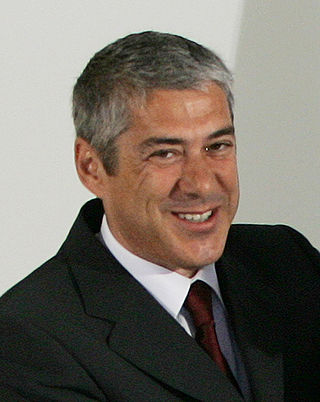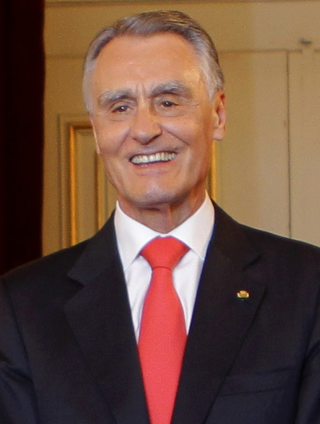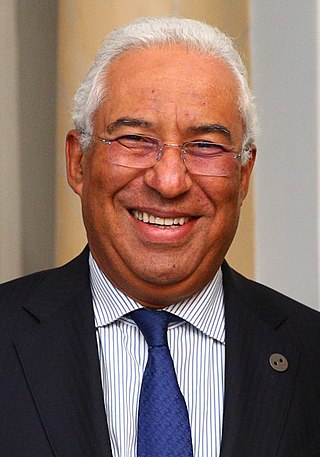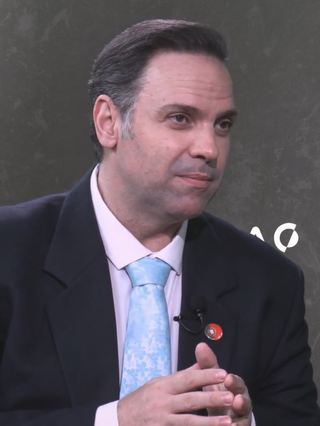
Politics in Portugal operates as a unitary multi-party semi-presidential representative democratic republic, whereby the Prime Minister of Portugal is the head of government, and the President of Portugal is the non-executive head of state which, although it is a somewhat ceremonial figure, has some significant political powers they exercise often. Executive power is exercised by the Government, whose leader is the prime minister. Legislative power is primarily vested in the Assembly of the Republic, although the government is also able to legislate on certain matters. The Judiciary of Portugal is independent of the executive and the legislature. The President exerts a sort of "moderating power", not easily classified into any of the traditional three branches of government.

The Social Democratic Party is a liberal-conservative political party in Portugal that is currently the country's ruling party. Commonly known by its colloquial initials PSD, on ballot papers its initials appear as its official form PPD/PSD, with the first three letters coming from the party's original name, the Democratic People's Party. A party of the centre-right, the PSD is one of the two major parties in Portuguese politics, its rival being the Socialist Party (PS) on the centre-left.

The CDS – People's Party is a conservative and Christian democratic political party in Portugal. It is characterized as being between the centre-right and right-wing of the political spectrum. In voting ballots, the party's name appears only as the People's Party, with the abbreviation CDS–PP unchanged.

Pedro Miguel de Santana Lopes is a Portuguese lawyer and politician, who is the current mayor of Figueira da Foz. He most notably served as prime minister of Portugal from 2004 to 2005.
Since the beginning of liberalism in Portugal in the 19th century, several parties have, by gaining representation in parliament, continued the liberal ideology in contemporary Portuguese politics. But after the initial fervor of the Liberal Revolution of 1820 and the outcome of the Liberal Wars (1828–1834) during the 19th century, liberalism was relegated to a secondary role in Portuguese politics and government and even outlawed for periods of time. The first fully-fledged liberal party founded as such to have a seat in the Portuguese Parliament since the end of the First Portuguese Republic (1910–1926), was the Liberal Initiative, in 2019.

Presidential elections were held in Portugal on 14 January 1996.

The 1995 Portuguese legislative election took place on 1 October. The election renewed all 230 members of the Assembly of the Republic.

The 1985 Portuguese legislative election took place on 6 October. The election renewed all 250 members of the Assembly of the Republic.

Maria Manuela Dias Ferreira Leite is a Portuguese economist, pundit and retired politician. Ferreira Leite served as Minister of Education in Aníbal Cavaco Silva's third government, from 1993 to 1995, and as Minister of State and Finance in José Durão Barroso's government, from 2002 to 2004.

Aníbal António Cavaco Silva is a Portuguese economist and politician who served as the 19th president of Portugal, from 9 March 2006 to 9 March 2016, and as prime minister of Portugal, from 6 November 1985 to 25 October 1995. His 10-year tenure was the longest of any prime minister since Salazar, and the longest for a freely elected prime minister in Portugal's republican history. He was the first Portuguese prime minister to win an absolute parliamentary majority under the current constitutional system. He is best known for leading Portugal into the European Union.

The 2009 Portuguese legislative election was held on 27 September, to renew all 230 members of the Assembly of the Republic. The Socialist Party, led by incumbent Prime Minister José Sócrates, won the largest number of seats, but didn't repeat the overall majority they gained in 2005.

Aníbal Cavaco Silva served as Prime Minister of Portugal from November 1985 to October 1995. He became prime minister after serving as president of the Conservative Social Democratic Party (PSD) since May 1985. For almost all of his 10 years as prime minister, Cavaco Silva ruled in cohabitation with President Mário Soares. The 10-year period during which Cavaco Silva led the government is often dubbed Cavaquismo in Portuguese, which could be translated as Cavacoism.

Presidential elections were held in Portugal on 23 January 2011. The elections resulted in the re-election of Aníbal Cavaco Silva to a second term as President of Portugal. Turnout in this election was very low, where only 46.52 percent of the electorate cast their ballots. Cavaco Silva won by a landslide winning all 18 districts, both Autonomous regions of Azores and Madeira and 292 municipalities of a total of 308.

Pedro Manuel Mamede Passos Coelho is a Portuguese politician and university guest lecturer who was the 117th prime minister of Portugal, in office from 2011 to 2015. He was the leader of the Social Democratic Party (PSD) between 2010 and 2018.

The 2011 Portuguese legislative election was held on 5 June, to elect all 230 members of the Assembly of the Republic. Pedro Passos Coelho led the centre-right Social Democratic Party to victory over the Socialist Party, led by incumbent Prime Minister José Sócrates. Despite a historically low turnout of less than 60 percent of registered voters, the right-wing won a clear mandate, winning nearly 130 MPs, more than 56 percent of the seats, and just over 50 percent of the vote. While the People's Party, continuing the trend they began in 2009, earned their best score since 1983, the Social Democrats exceeded the expected result in the opinion polls and won the same number of seats as they did in 2002, when the PSD was led by José Manuel Durão Barroso. Of the twenty districts of the country, Pedro Passos Coelho's party won seventeen, including Lisbon, Porto, Faro, Portalegre, Castelo Branco, Coimbra, Santarém and the Azores, that tend to favor the Socialist Party.

The 2015 Portuguese legislative election was held on 4 October. All 230 seats of the Assembly of the Republic were in contention.

The PSD/CDS coalition is a recurring conservative political and electoral alliance in Portugal formed by the Social Democratic Party (PPD/PSD) and CDS – People's Party (CDS-PP).

The 2019 Portuguese legislative election was held on 6 October 2019. All 230 seats to the Assembly of the Republic were contested.
The following lists events in the year 2015 in Portugal.

Jorge Nuno Fernandes Traila Monteiro de Sá is a Portuguese politician who has been the President of Alliance since 2021.
















